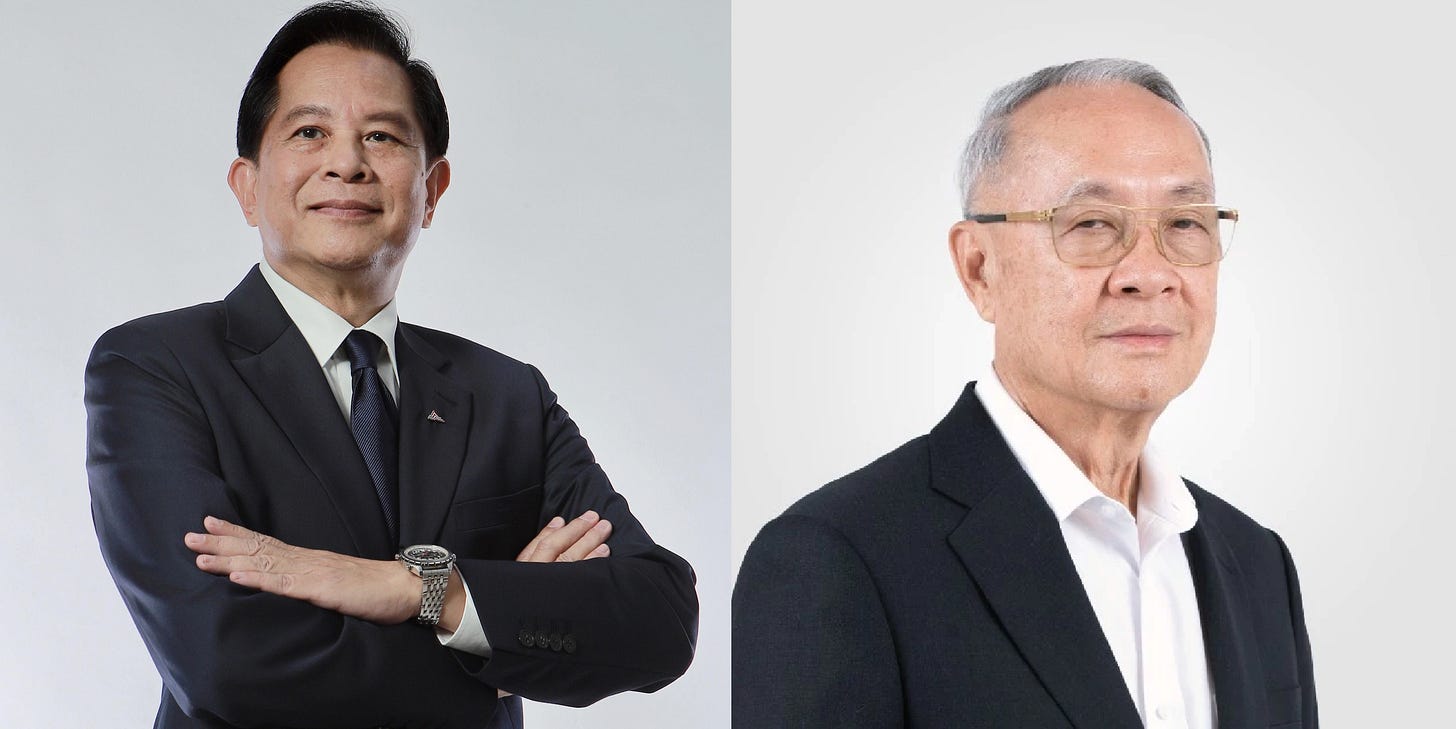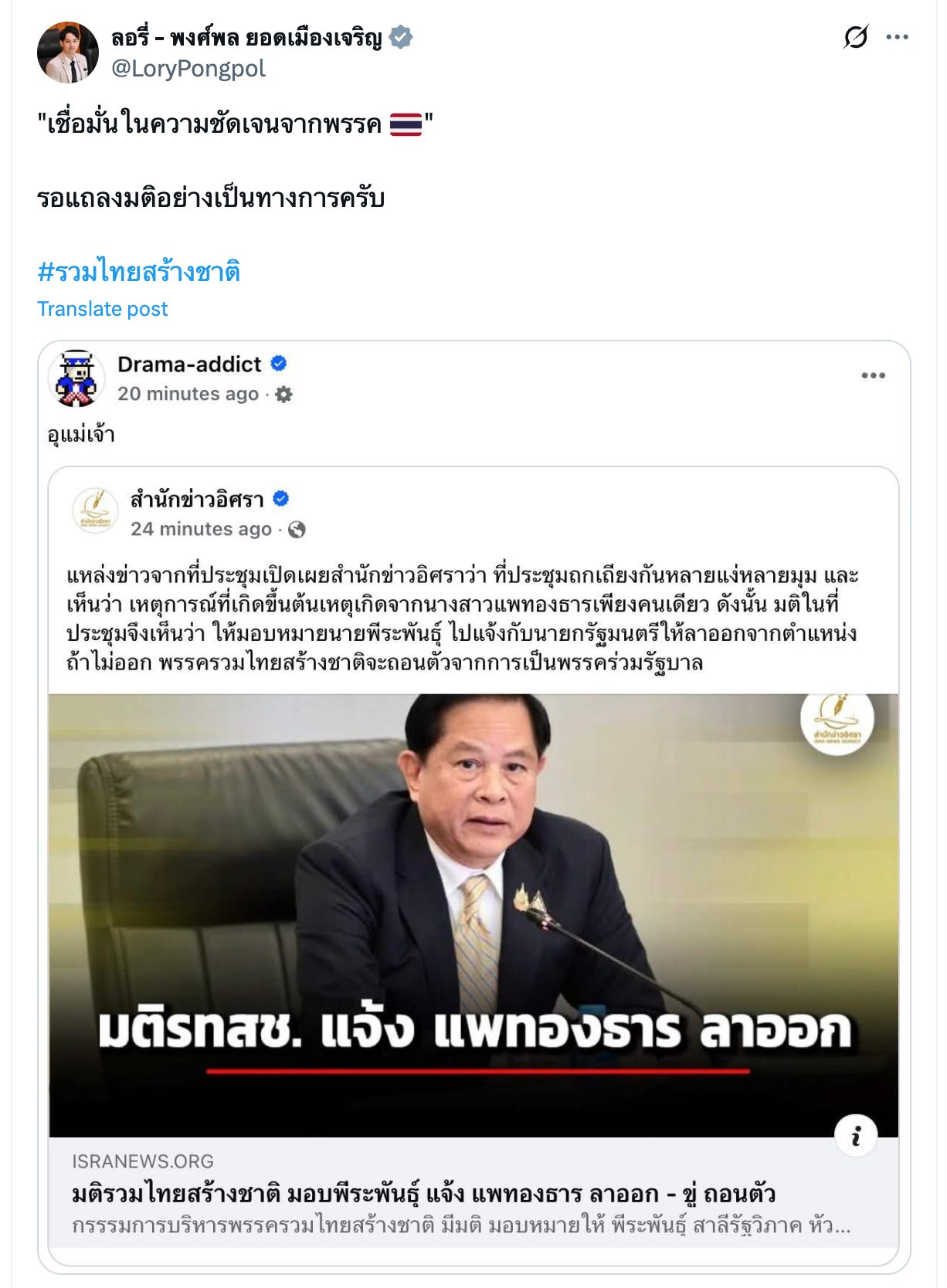United Thai Nation Pushes for a Change in Prime Minister
Paetongtarn Shinawatra faces a choice

To all subscribers: my apologies for the recent avalanche in emails! Given the speed at which Thai politics is currently operating, posts will be more frequent than usual during this crisis.
Yesterday, I outlined in this piece on the leaking of Prime Minister Paetongtarn Shinawatra’s call with Cambodia’s de facto leader Hun Sen and Bhumjaithai’s withdrawal from the coalition that there are two main routes that the government can take. The first option is for Paetongtarn to resign and be replaced by another candidate from the coalition. The second option is for Pheu Thai to dissolve parliament and call for new elections. There is a third option that yesterday I thought unlikely: all the parties remain in the coalition and back Paetongtarn, which would mean no immediate change in the status quo. Three parties — Chart Thai Pattana, United Thai Nation, and the Democrats — called meetings of their executive boards today to discuss whether or not to remain in the coalition and hence trigger one of the options above.
Paetongtarn’s press conference earlier today made it clear that she has no intention of resigning voluntarily. Almost all the coalition parties indicated they would remain in the coalition:
Pheu Thai allies Kla Tham (26 seats) and Prachachart (9 seats) expressed unequivocal support.
Chart Thai Pattana (10 seats) has decided to remain with the coalition for now and seek “more information” from the prime minister.
The Democrats (25 seats) said that there were diverse opinions expressed at their meeting and that they will need to talk to the prime minister before party leader Chalermchai Sri-orn can make a written statement. (Later reports suggested that a majority of party executives want to remain in the coalition).
Most interestingly, United Thai Nation leader Pirapan Salirathavibhaga (officially 36 seats, but only half remaining in Pirapan’s faction) left his party’s meeting without making a statement, saying that the UTN had instructed him to meet with Paetongtarn. But according to various new agencies (here I quote Naewna:
Reports from the meeting said that the party had analyzed the current situation and saw that the prime minister must fix the political problems. If the United Thai Nation Party withdrew, the coalition parties would become the opposition, which would lead to a dissolution of parliament. This would happen as the People’s Party enjoys overwhelming support at an even greater level than in the previous election. Therefore, in the meeting there was a resolution that Pirapan should talk to the prime minister to discuss a solution to the problem that has occurred. The United Thai Nation Party can accept a change in prime minister. Currently, Pheu Thai still has a candidate remaining in Chaikasem Nitisiri.
The party deputy spokesperson, Pongpol Yodmueangcharoen, posted a screenshot of a news report saying that “the party charged Pirapan with pushing the prime minister to resign, and if they do not resign, the UTN will leave the coalition.”
Let’s unpack this a little bit.
Why Chaikasem Nitisiri?
Digesting this resolution requires an understanding of one of the peculiarities of the current Thai constitution. Only prime minister candidates pre-submitted prior to the election by parties that end up winning at least 25 seats may be considered by parliament. (As I understand it there is a process for a vote to take place on considering an outsider, but requires a very high bar in parliament). As such, the only candidates who are eligible to be prime minister are:
Pheu Thai’s candidates: Srettha Thavisin (already disqualified by the Constitutional Court), Paetongtarn Shinawatra (the current prime minister), Chaikasem Nitisiri
Bhumjaithai: Anutin Charnvirakul (has just left the coalition)
United Thai Nation: Prayut Chan-o-cha (currently serving on the privy council), Pirapan Salirathvibhaga
Democrat: Jurin Laksanawisit (no longer the leader of his own party)
Palang Pracharath: Prawit Wongsuwan (left the coalition last year)
From this list, it is clear that Chaikasem and Pirapan himself are basically the only viable candidates remaining. Since Pheu Thai is by far the largest party in the coalition, Chaikasem Nitisiri becomes the candidate that makes the most sense politically to succeed Paetongtarn.
Can this work?
We can view the UTN’s decision through a pragmatic lens. Given its divided state, it is certainly not ready for an election. With Bhumjaithai leaving the coalition, all the remaining partner parties are due to receive more ministries. But at the same time, given its conservative base’s immense dissatisfaction with Paetongtarn, the party would need a way to alleviate the political pressure it is facing. So getting the prime minister to resign — or at the very least giving off the appearance that it has pushed for her to resign — is probably the best option available for the UTN short of just leaving the coalition.
There are two main questions that come with this, however.
For one, what bargaining power is the UTN bringing to the table? If this were a unified push with the other coalition parties, then Pheu Thai would have to think seriously about this demand. Was the reason that Chart Thai Pattana and the Democrats all said they needed further discussions with the prime minister because they also want to ask if she were willing to resign? No report has indicated this were the case so far, although it is possible. But if the UTN is acting alone, I’m not sure that Pirapan has a credible threat given 1) the UTN’s lack of readiness for an election and 2) the few MPs he has in his faction.
Secondly, this is not the first time we are going through the Chaikasem discussion. Last year, when former prime minister Srettha Thavisin was pushed out, the initial rumors also pointed to Chaikasem being the next premier. Yet concerns emerged that Chaikasem had once penned a letter suggesting that Pheu Thai would bring legislation on amending the lese-majeste law for parliamentary consideration. Some feared that it could lead to him being disqualified down the road. In addition, Chaikasem had a medical emergency in 2023, forcing him to say last year that he was now healthy and ready to be prime minister. Given that he is the last Pheu Thai candidate remaining, in the end: needs must?
Or is the real play to make Pirapan prime minister?
One option that commentator Kittitouch Chaiprasith suggested is that the UTN’s real play here might be to force Pheu Thai to hand the premiership to Pirapan himself. With Srettha disqualified, Paetongtarn unviable, Chaikasem rumored to be ill, Anutin and Prawit out, and Jurin forgotten: the premiership might be in Pirapan’s grasp.
It sounds a little crazy, but it is not unprecedented. MR Kukrit Pramoj famously became prime minister in 1975 despite his Social Action Party having only 18 MPs out of 269 seats, because the election-winning Democrat Party’s government collapsed and Kukrit was able to establish a coalition with a majority. (That said, his fragile government only lasted a year before it collapsed).
This would be an unexpected outcome, but it is not out of the realm of possibility at this point.
What if Pheu Thai refuses?
Finally, it’s worth taking some time to dissect what could happen if Pheu Thai refuses a change in prime minister and the UTN also decides to back down and remain in the coalition. That is possible, and the status quo would prevail. It would be a very uneasy status quo — the government’s majority is now thin and it is reliant on renegade MPs from opposition parties whose loyalties are suspect to give it a measure of parliamentary security. But Paetongtarn would remain prime minister for the short term.
I still find it unlikely that her premiership will be viable for an extended period, however. A group of senators asked the National Anti-Corruption Commission to remove the prime minister. A former senator filed for an investigation into Paetongtarn. Another petitioner asked the Electoral Commission to investigate her for ethical violations. With all of these legal threats coming, I would not be at all surprised if in the end she is forced from office before the end of the parliamentary term. In addition, I would expect protests against the government (which have been relatively small before now) to gather steam.
We are nowhere near the end of the fallout from this leaked phone call yet.



Excellent coverage of the political scene in Thailand at a fascinating time. I’m learning a lot with every post.